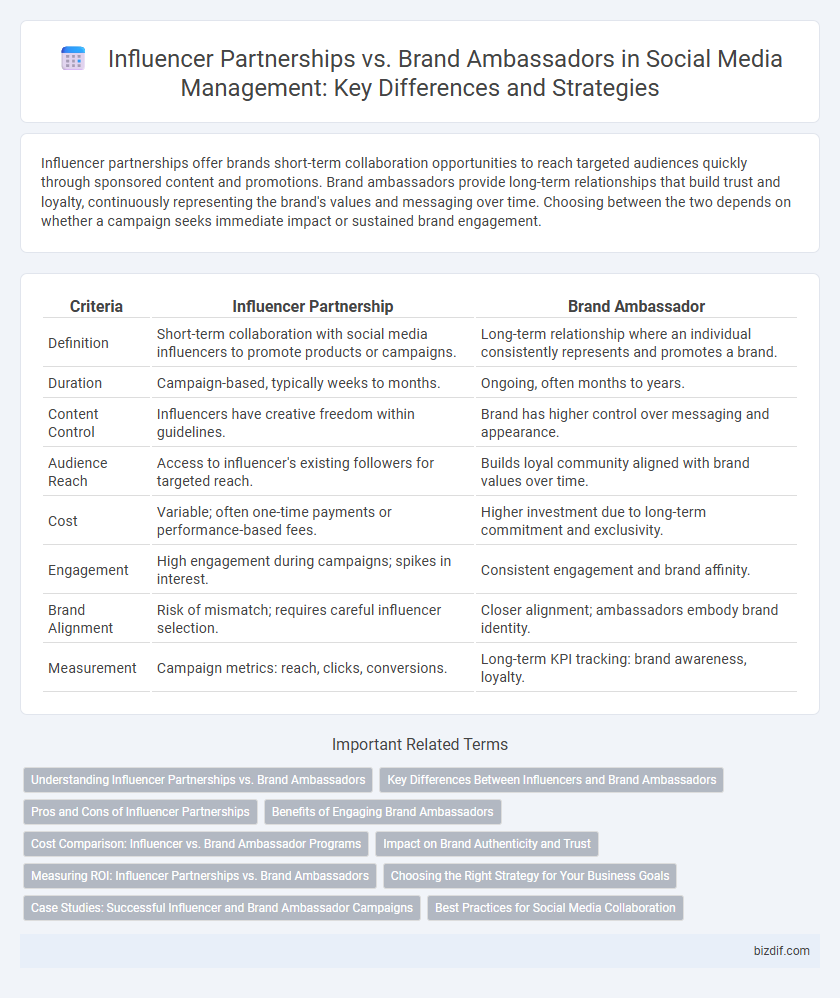Influencer partnerships offer brands short-term collaboration opportunities to reach targeted audiences quickly through sponsored content and promotions. Brand ambassadors provide long-term relationships that build trust and loyalty, continuously representing the brand's values and messaging over time. Choosing between the two depends on whether a campaign seeks immediate impact or sustained brand engagement.
Table of Comparison
| Criteria | Influencer Partnership | Brand Ambassador |
|---|---|---|
| Definition | Short-term collaboration with social media influencers to promote products or campaigns. | Long-term relationship where an individual consistently represents and promotes a brand. |
| Duration | Campaign-based, typically weeks to months. | Ongoing, often months to years. |
| Content Control | Influencers have creative freedom within guidelines. | Brand has higher control over messaging and appearance. |
| Audience Reach | Access to influencer's existing followers for targeted reach. | Builds loyal community aligned with brand values over time. |
| Cost | Variable; often one-time payments or performance-based fees. | Higher investment due to long-term commitment and exclusivity. |
| Engagement | High engagement during campaigns; spikes in interest. | Consistent engagement and brand affinity. |
| Brand Alignment | Risk of mismatch; requires careful influencer selection. | Closer alignment; ambassadors embody brand identity. |
| Measurement | Campaign metrics: reach, clicks, conversions. | Long-term KPI tracking: brand awareness, loyalty. |
Understanding Influencer Partnerships vs. Brand Ambassadors
Influencer partnerships typically involve short-term, campaign-specific collaborations where influencers promote products to their audience, providing immediate brand exposure and engagement. Brand ambassadors represent a longer-term commitment, embodying the brand's values and consistently delivering authentic promotion across multiple platforms. Understanding these distinctions helps businesses align marketing strategies with goals, optimizing ROI and fostering brand loyalty.
Key Differences Between Influencers and Brand Ambassadors
Influencer partnerships typically involve short-term collaborations aimed at promoting specific campaigns or products, leveraging the influencer's reach and engagement to drive immediate awareness and sales. Brand ambassadors maintain long-term relationships, consistently representing and embodying the brand's values, often creating ongoing authentic content that fosters deeper trust with the audience. Key differences include the duration of collaboration, the level of brand alignment, and the type of content created, with ambassadors acting as dedicated advocates while influencers serve as flexible marketing assets.
Pros and Cons of Influencer Partnerships
Influencer partnerships offer brands fast access to niche audiences and creative content, enhancing engagement and brand awareness. However, challenges include inconsistent brand alignment, potential authenticity issues, and less control over messaging compared to long-term brand ambassador relationships. Budget variability and short-term focus may limit sustained brand loyalty and measurable ROI in influencer collaborations.
Benefits of Engaging Brand Ambassadors
Engaging brand ambassadors fosters authentic long-term relationships that enhance trust and credibility, resulting in higher customer loyalty and sustained brand advocacy. Unlike one-time influencer partnerships, brand ambassadors consistently represent the brand's values and voice across multiple platforms, amplifying brand awareness effectively. This continuous engagement drives deeper audience connections and measurable growth in social media presence and sales.
Cost Comparison: Influencer vs. Brand Ambassador Programs
Influencer partnerships typically involve one-time payments or campaign-based fees, which can range from a few hundred to several thousand dollars depending on the influencer's reach, making them cost-effective for short-term promotions. Brand ambassador programs usually require long-term contracts with monthly retainers or commissions, often resulting in higher overall expenses but offering consistent brand representation and deeper audience trust. Businesses must balance immediate budget constraints against sustained engagement value when choosing between influencer collaborations and brand ambassador programs.
Impact on Brand Authenticity and Trust
Influencer partnerships bring short-term visibility and diverse content that can enhance brand authenticity by leveraging the influencer's unique voice and audience trust. Brand ambassadors build long-term relationships with consistent messaging, fostering deeper emotional connections and sustained trust in the brand. Both strategies impact brand authenticity differently, with partnerships offering dynamic engagement and ambassadors providing stable, credible representation.
Measuring ROI: Influencer Partnerships vs. Brand Ambassadors
Measuring ROI in influencer partnerships centers on campaign-specific metrics such as engagement rates, click-through rates, and short-term sales spikes, providing granular insights into immediate performance. Brand ambassadors generate long-term ROI through enhanced brand loyalty, sustained customer lifetime value, and consistent brand advocacy, which are tracked via brand sentiment analysis and repeat purchase behavior. Selecting between the two depends on whether a brand prioritizes immediate campaign impact or ongoing, cumulative brand equity growth.
Choosing the Right Strategy for Your Business Goals
Influencer partnerships offer short-term, campaign-specific reach and engagement ideal for product launches or seasonal promotions, while brand ambassadors provide long-term brand loyalty and consistent messaging to build trust and recognition. Evaluate your business goals by analyzing desired campaign duration, target audience engagement, and budget allocation to select the optimal strategy. Businesses aiming for sustained brand growth benefit from brand ambassadors, whereas those seeking rapid visibility and influence gain advantage through influencer collaborations.
Case Studies: Successful Influencer and Brand Ambassador Campaigns
Case studies reveal that influencer partnerships often drive rapid brand awareness with short-term campaigns, as demonstrated by Daniel Wellington's influencer-driven growth across Instagram. Brand ambassador programs yield sustained brand loyalty and deeper consumer trust, exemplified by Nike's ongoing relationships with athletes like LeBron James. Analyzing metrics like engagement rates, conversion rates, and long-term revenue growth highlights the strategic benefits of integrating both approaches for comprehensive social media management.
Best Practices for Social Media Collaboration
Effective social media collaboration involves selecting the right partnership model to maximize brand impact; influencer partnerships typically focus on short-term campaigns with creative content tailored to specific promotions, while brand ambassadors provide long-term, authentic representation aligned with the brand's core values. Best practices include clearly defining objectives, ensuring alignment in audience demographics, and establishing transparent communication to maintain consistency and trust across all platforms. Regular performance monitoring and feedback loops optimize engagement rates and ROI, reinforcing the partnership's strategic value.
Influencer partnership vs Brand ambassador Infographic

 bizdif.com
bizdif.com